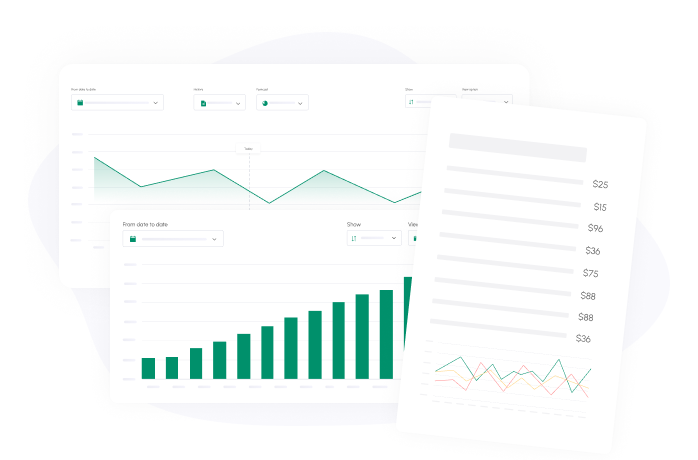

No matter the size of your business or your industry, it’s important to master cash flow management. Cash flow is the lifeblood of your business, and without proper management, you could easily find yourself unable to make ends meet.
But what exactly is cash flow management? Why is it so important, and how do you do it? We’ll answer all that and more in our helpful guide.
What Is Cash Flow Management?
Cash flow management is the practice of tracking how much cash is coming into and out of a business. The purpose of managing cash flow is to ensure that a business has enough funds to keep operations running or achieve its goals.
Through proper management, you can:
- Estimate how much cash your business will have in the future.
- How much your business needs to cover its expenses, like paying employees and suppliers.
Businesses that are looking for tips on how to manage cash flow problems should start with improving their cash flow management. Careful tracking of your cash inflows and outflows can help you avoid common cash flow problems that many businesses face.

Why Is Cash Flow Management Important?
Now that you know what management is, you may be asking: why is managing cash flow important? And why are cash flow statements useful in managing money?
- According to US Bank, 82% of businesses fail because they manage their cash flow poorly.
- Cash flow statements provide you with information about your gross receipts and gross payments for a certain period of time.
Proper cash flow management will help ensure that your business doesn’t run out of cash or invests a cash surplus wisely. Accurate cash flow statements can also help give you a clear picture of your business’s financial health.
How To Manage Cash Flow in Business - Best Practices
You know why management is important, but how do you do it? What are the best cash flow management techniques?
Let’s look at the best practices for managing your business’s cash flow.
Understand The Importance of Cash Management In Business
Before you can start implementing the best practices for cash flow management, you really need to understand the importance of cash management.
Without proper cash management, your business may find itself running out of cash in the future. If you run out of cash, you can’t pay:
- Suppliers and vendors
- Employees
- Debts
- Utilities and other bills
Managing your cash flow will allow you to predict when your business will run out of money and take action now to prevent that from happening.
Track Your Income and Expenses
Cash management is all about tracking your income (cash inflows) and expenses (cash outflows). It’s the most fundamental practice you can perform and the most important.
It’s crucial to be thorough when listing your cash inflows and cash outflows. Overlooking an income source or expense will skew your figures and leave you with an inaccurate picture of your business’s financial health.
Cash inflows can include:
- Proceeds from sales
- Returns on investments
- Loan receipts
- Supplier refunds
- The sale of assets Cash outflows can include:
- Employee salaries
- Rent/utilities
- Payments to vendors
- Debts
- Maintenance of your business premises
- Dividends paid to shareholders
Predict Cash Flows for the Next 3-6-12-13 Months with Multiple Scenarios
Once you have a complete and accurate picture of your income and expenses, you can use this data to predict your cash flows for:
- 3 months
- 6 months
- 12 months
- 13 months
The simplest way to create multiple scenarios is to use a tool like Cash Flow Frog. Cash Flow Frog uses data from your accounting software for accurate scenario planning using the most up-to-date information.
When you create multiple scenarios, you can predict your cash flow over the short term and long term. These predictions can help you make decisions to prevent cash flow shortages or put a cash surplus to good use.
Find Out Your Breakeven Point
When managing your cash flow, it’s important to know your breakeven point. Your breakeven point is the point at which your business’s expenses are equal to your profits.
In other words, you’re generating just enough cash to keep your operations going.
Your breakeven point will be your benchmark for determining whether you’ll run into a cash shortage. If your cash scenario planning shows that you’ll fall below your breakeven point, you’ll know that you need to take steps to improve revenue or cut back on expenses.
Identify Business Risks and Be Prepared for Them in Advance
Another important aspect of managing cash flow is identifying business risks and preparing for them ahead of time. Business risks can include:
- Slow periods/seasons
- Changes in the market
- Regulation changes
Being able to identify risks ahead of time allows you to prepare and take action now to potentially mitigate these risks.
Do Not Focus on Profit, Focus on Cash Flow
Another important practice for cash flow management is not to focus on profit, but to focus on cash flow instead.
Often, businesses fixate on profit, but cash flow is what ensures you have enough funds to pay your bills and keep your operations running.
A business can be profitable but have negative cash flow. Negative cash flow can be okay, but only if it’s temporary.
Spend Your Money Wisely and Cut Costs
Proper management practices must also take your expenses into account. Cutting back on expenses is a quick and easy way to improve cash flow issues or prevent them from happening in the first place.
Examine your expenses closely to see where you can cut back or eliminate costs.
- Negotiate with suppliers
- Negotiate with your landlord for lower rent
- Eliminate expenses that don’t contribute directly to the growth and operation of your business
But what if you have a cash surplus and aren’t concerned about running out of money? Having too much cash on hand can also be a problem because your money isn’t working for you. Growth can stagnate because you’re just sitting on an influx of cash.
In this case, it’s important to make smart investments. Spend your money wisely and focus on things that will support growth.
Automate This Process with a Cash Flow Management Software
One of the best things you can do to improve your cash flow management is to use a tool like Cash Flow Frog to automate the entire process.
Manually managing cash flow is time-consuming, and there’s a greater risk of human error. Automation will save you time and reduce the risk of error, so you can get an accurate picture of your cash flow.

Implement Cash Flow Frog - The Best Software for Cash Flow Management
Automation is one of the top best practices for cash flow management, and Cash Flow Frog can help you with virtually all of your cash flow needs.
With Cash Flow Frog, you can:
- Create accurate cash flow forecasts in just a few clicks
- Engage in scenario planning to see how your cash flow may be affected by your decisions
- View your planned vs. actual results
- Engage in cash flow planning over the long-term to make smarter business decisions now
Cash Flow Frog can help you with all of the points above and more. You can get started today for free and start taking control of your business’s cash flow.
Related posts:
You may be interested:
New:













